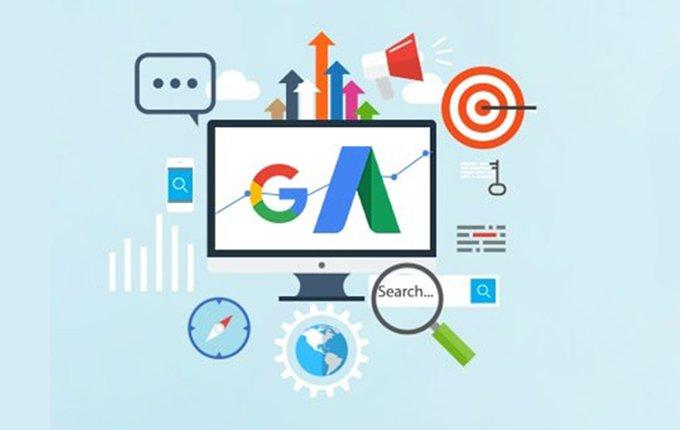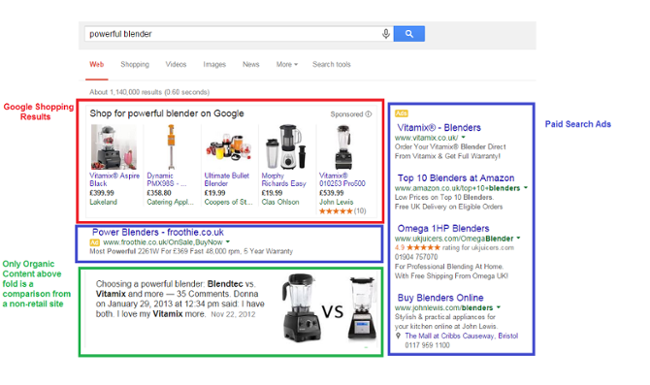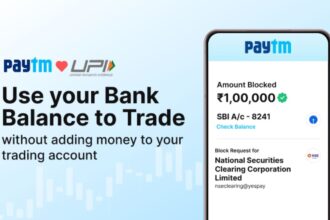The world of online paid advertisements, which is full of acronyms and jargon, can be a little bit bewildering at times. Frequently, a single advertisement can have more than one label attached to it. When attempting to classify paid advertisements, the most straightforward approach is to divide them into two distinct types: display ads and search ads.
-
Search Ads
Advertisements that are displayed in response to a user’s search for information or a specific product are referred to as search ads. When you search for something using Google, the paid-for results, also known as Google Ads, will appear above the organic results. This is the most frequent type of online advertisement.
-
Display Ads
Advertisements that are displayed in other contexts are known as display advertising. For example, the type of advertisements that play before starting a video on YouTube or the banner ads that show on a website with the content that was originally published there.
Display and Search frequently interact with one another in a number of different ways. Display Ads and Search Ads aren’t always completely distinct from one another because of the complex monitoring and search algorithms that are used to keep track of what you search for and display content based on those searches.
But first: what exactly is meant by the term “paid search marketing”?
Paid search marketing refers to any pay-per-click advertising service offered by search engines like Google and Bing, as well as other search engines, which enables businesses to advertise directly on the pages that display search results. The amount that an advertiser is willing to spend each time a searcher clicks on their ad is what they bid on when placing their ad in the auction. The name for this fee is “cost per click” (CPC).
Your visibility on search engines, the number of visitors to your website, and ultimately your number of sales can all be increased by using paid search advertisements, which are an extremely valuable tool for any company. In conclusion, paid search offers a good return on investment by providing a greater click-through rate (CTR) than any other form of pay-per-click (PPC) advertising and a higher average conversion rate than organic search.
Different Types of Paid Search Ads
Search Engine Text Ad
These Pay Per Click advertisements are the most prevalent type. They appear before organic listings in the SERPs. They may show up above, to the right of, or below organic listings depending on the cost of the advertisement and the search engine. They must identify themselves as sponsored content. The majority of these ads are sold through Google AdWords, but Yahoo and Bing also have their own ad networks.
These ads are straightforward and elegant; you simply choose the search term that will cause them to appear and then create your ad how you would like it to look, naturally adhering to the search engine requirements. They operate on a “bid” structure; the higher the SERPs you would like to appear, the higher the cost. Cheaper keywords are those with low competition. This advertising can be targeted in a variety of ways, including by location, time of day, or by employing negative keywords.
These commercials are easy to manage, monitor, and evaluate in terms of their effectiveness. It is not difficult to create a budget, and you may zero down on very specific aspects of it. It is extremely important to keep in mind that you will only be charged for the advertisement when it is actually clicked on by a user. As a consequence of this, you will not be billed every time a customer sees your advertisement; rather, you will be billed only when they decide to click on it. Search engine pay-per-click advertising is easy to get started with, but it may be difficult to master and has a steep learning curve that never ends.
Google Shopping
Google Shopping advertisements act in a manner that is quite similar to that of traditional pay-per-click (PPC) advertisements. They operate on the basis of keywords, are highly targetable, and provide a high level of measurable data. Because they typically have a cheaper cost per conversion than text advertising, they are an excellent choice to make if you have a product that you want to sell. On the other hand, in regard to your online inventory, you are required to adhere to the stringent policies and processes of Google. You may have a substantial presence on the main page of Google by running your campaigns effectively, employing Google Shopping ads, coupled with well-targeted SEO and text PPC ads. This will allow you to have the ability to have a significant presence on the main page of Google.
Remarketing/Retargeting
These adverts combine aspects of display and search in some ways. Displaying an advertisement to a user that is tailored to their previous actions is an example of remarketing. This is the reason why, if you have been looking into trips, a tonne of banner advertisements for travel agencies and hotels will start to display on the websites that you visit. The advertisements that accompany remarketed content most frequently take the form of native ads or more traditional display ads.
Remarketing is an excellent strategy that can significantly boost both the awareness and recognition of a business. It takes a little longer to set up when compared to standard display ads and pay-per-click advertising, but once it is, you have the ability to have your brand and products follow your customers around the web. You can add the qualifier that you know they’ve already expressed interest in your business or product, in addition to using the same targeting methods as with other Paid Search Ads, which allows you to use the same targeting tactics.
5 Reasons To Use Paid Search Ads
1. To increase the amount of organic traffic
There are businesses that just do not have the luxury of time to wait for the benefits of SEO to materialise. Search advertisements get people to solutions a great deal faster than organic results, which place a greater focus on comparative content. Search engine marketing is a great short-term strategy because of this, and it can help you improve your organic profile while you work on it.
2. If your sales cycle is brief
Search advertisements are fantastic for you if your product or service has a short sales cycle and you don’t need to maintain promoting (remarketing) to people who have shown interest in your brand in the past.
3. If your financial resources are restricted
If you are just starting out or establishing a campaign with a smaller budget for a variety of reasons, advertising through search engines may be the ideal alternative for you to consider.
-
You can choose to pay either per click or per 1,000 impressions when you are conducting an ad campaign using PPC (pay-per-click).
-
Bidding on highly relevant keywords gives you greater control over who you target, which in turn results in more qualified leads, higher conversion rates, and a better return on investment (ROI).
-
After you have mastered PPC efforts, which are easier to quantify and defend, you can think about expanding to the Display Network. PPC efforts are simpler to quantify and defend.
4. In order to gather high-quality potential customers
When running search ad campaigns, you have the option of using a variety of different keyword match types to activate your ad. Additionally, you have the option of using negative keywords to ensure that your ad is not activated when users search for specific keywords that are unrelated to your company. By using this, you will be able to build your advertisements in such a way that they closely match the search intent of a user, just like the example down below.
5. To promote the sales of emergency supplies
If you are in the business of providing an “urgent” or “emergency” service, it is highly recommended that you begin with search engine advertisements (plumbers, locksmiths, tow trucks, emergency vets, electricians, etc.). If a person is reading a blog post or scrolling through Facebook when they come across your display ad, it is quite unlikely that they will pay for the services being advertised.
Instead, individuals are likely to look for a service that can help them immediately if they unexpectedly find themselves unable to access their vehicle or if their pet develops a serious illness.
Search Ads Vs. Display Ads
Some advertisers argue over whether traditional PPC advertisements are more valuable than display ads, but the answer to this question is straightforward and depends entirely on the goals of your company. The intent is the primary factor that differentiates display ads from search ads. The display network is responsible for generating demand, while search advertising is a response to the demand that has been generated.
Intent-based searches are the most effective for search network advertisements since they indicate that the user has an immediate need for something and is looking for information to assist in resolving a problem. Intentionally designed search queries will almost always result in the user clicking through from the search engine results page (SERP) to a particular landing page. As the advertiser, it is your responsibility to determine the terms that your buyers and audience of interest are actively searching for. The use of search ads is quite beneficial for increasing sales and achieving a high return on investment.
Display advertisements, on the other hand, are the most effective when it comes to raising awareness and may be purchased using a variety of models, including CPM and PPC. When a user is perusing the web or participating in online forums, they will frequently see this sort of advertisement. Display advertisements are like leaving little breadcrumbs that lead customers back to your website, even if they aren’t actively looking for the goods you sell. Because the user might not be aware of who you are or that they require your service, it is your responsibility as an advertiser to demonstrate to the user that there is a requirement for the services that you have to provide. You are not attempting to make a sale right away at this point of the game; rather, you are providing good content that will assist create awareness.




















